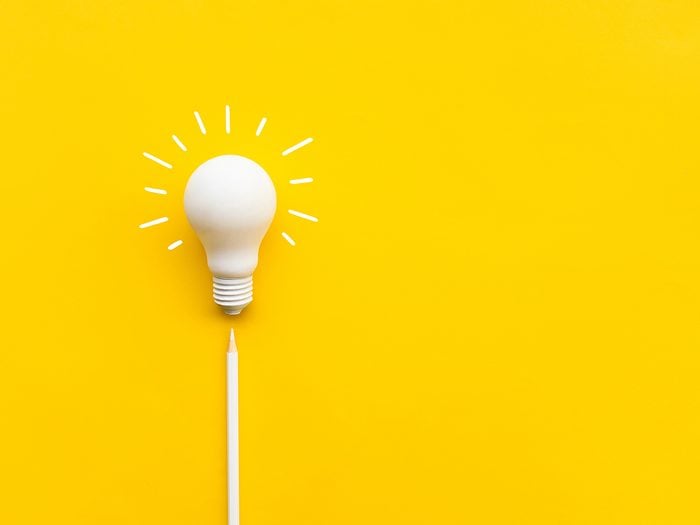
How to improve your memory
You probably know someone who seems to never forget a thing: Names, events, things that happened years ago can be recalled in seconds. How do these people do it? Mnemonic tricks can help boost your memory, but more importantly, good lifestyle habits as well as strategies for processing new information can improve how your memory works. It’s not just about rote memorization—it’s about how info “sticks” in the brain to use later on.
“Memorizing ‘stuff’ should not be the goal,” says Jennifer Zientz, MS, head of clinical services with the Center for Brain Health at the University of Texas at Dallas. “Using what you remember—combining memories with other knowledge to form new ideas and to make choices—is a more healthy way to use your brain, and will enhance your life more than worrying about your ability to remember ‘stuff.'” Read on for tips on how to improve your memory, and ultimately expand your brain’s potential.
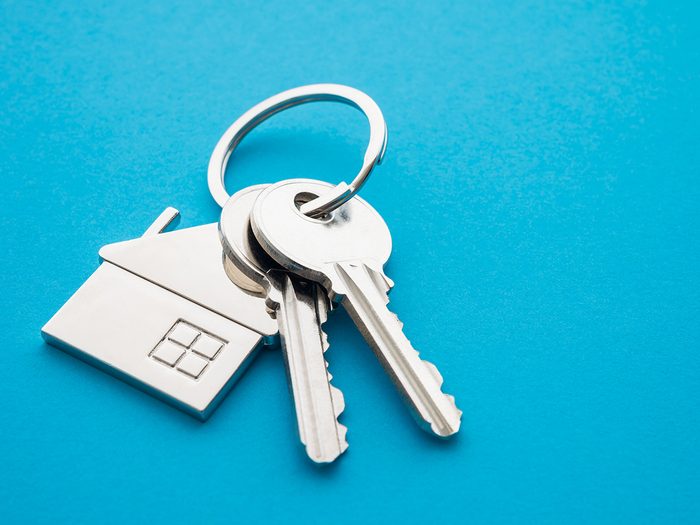
Establish routines
In order to free up your brain to remember new and important information, don’t waste energy trying to recall where you put your keys: It really is easier to find things if you always put them in the same place. “Having a routine can be very helpful for memory,” Zientz says. “Routines help us attain efficiency so we don’t have to expend a lot of brain power on predictable elements of our day. Efficiency in everyday activities frees up time and brain power for more meaningful things in our lives.”
These brilliant home organization hacks can help.

Use your senses
If you have to put something in an unfamiliar place, say what you are doing out loud: “I am putting my sunglasses on the table by the door.” Or when you meet someone new, repeat their name out loud. “Most of us learn better when we can take information in through more than one sense because it puts the information in a greater context,” says Zientz. By letting your ears register the information, research shows you enhance your focus on it, increasing your chances of remembering it later.
Discover the surprising benefits of reading out loud.

Don’t multitask
It’s no surprise we can’t remember things when our attention is divided. “Today, we have access to an unprecedented amount of information,” says Sandra Bond Chapman, PhD, founder and chief director of the Center for Brain Health. “It may seem counter-intuitive to slow down, but research has shown that the more people consume at once the shallower their thinking becomes. By taking in less information, you are better able to get meaning, develop knowledge, and actually build brain networks.” Filtering out these distractions improves the focus that leads to better memory, Zientz says. “The first thing we all have to do is put our cell phones away and stop multitasking,” she says.
Learn the truth about supplements and vitamins for memory.

Meditate
One way to boost your memory is to start meditating. Chapman says the first step to enhancing brain function is to “prime your brain” by quieting it—and research has found meditation helps you avoid distracting, anxious and stressful thoughts, which improves focus. One study showed students who took a mindfulness class and meditated for ten minutes a day did better on the GRE exam than students who didn’t. Research has also shown that meditation may actually change the structure of your brain by thickening areas associated with attention.
Discover more surprising benefits of daily meditation.
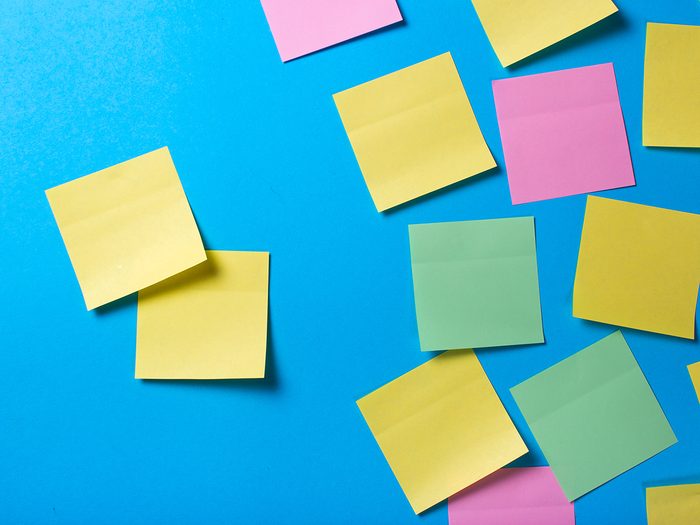
Organize info
Free up your working memory by using external aids to organize information. Set up reminders of what you need to do each day on your phone calendar. Better yet, studies have shown the simple act of writing things down can reinforce information in your memory. So keep adhesive notes in every room and leave handwritten reminders where you’ll see them, and write a list before you go to the store so you don’t forget anything. Jot down these notes when they’re fresh in your mind—planning ahead helps your working memory actually perform current tasks instead of thinking about what needs to be done later.
Here are 20 secrets professional organizers don’t want you to know.

Go out in nature
This simple activity can boost your memory by 20 percent. Similar to meditating, walking in nature may calm anxious and distracting thoughts that mess with memory, as well as give the brain a break from multitasking to improve its performance later on. In one study, participants who took a walk in nature did better on memory tasks than those who walked in an urban setting. “Nature—even getting a mere glimpse of it—helps the brain calm itself and reset,” Chapman says.
Here’s the easiest way to turn your daily walk into a full body workout.

Sleep on it
Research indicates people who get seven hours of sleep have better memories than those who get less than five or more than nine. This may be just the right amount for their brain to go through the chemical changes needed to integrate new skills or facts into long-term memory. “Sleep strengthens connections between brain cells and different brain regions, and moves information into areas of the brain that are more efficient for storing it,” says sleep expert Richard Shane, PhD, creator of the Sleep Easy method. “Dreaming sorts and organizes information, makes connections, and even solves problems. All of this strengthens memories and improves recall.”
Having trouble getting those recommended seven hours of sleep? Follow our ultimate sleep hygiene checklist.
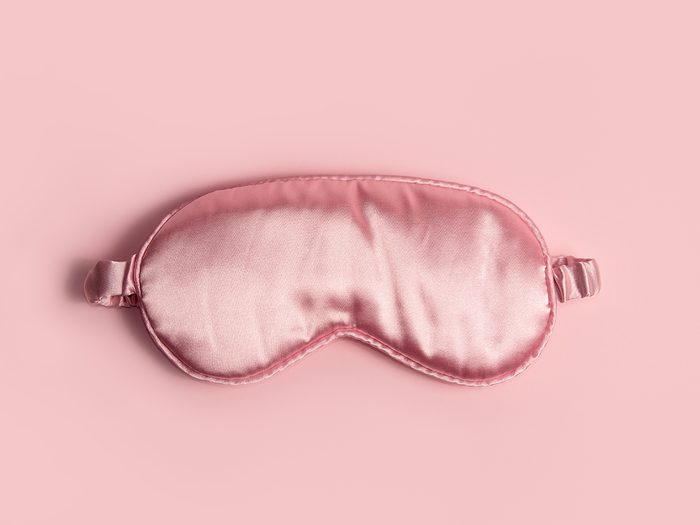
Take a nap
It’s not just nighttime sleep that helps solidify memory: Research has shown a short daytime snooze can improve recall as well. “In one study, people were given pairs of unrelated words to remember, and after, one group took a nap and the other watched videos,” Shane says. “The group that took a nap had a five-fold improvement in associative memory—the ability to remember a link between items that are unrelated—compared with the group that watched videos.”
Discover more secrets for a good night’s sleep.

Exercise daily
The physical and the mental are deeply connected, so exercise keeps your brain sharp by avoiding memory suckers like high blood pressure and diabetes. “Movement improves circulation, bringing blood, oxygen and nutrients to the brain, which can help to ensure it is functioning at its peak,” says fitness and nutrition expert Erin Palinski-Wade, RD, CDE, author of 2 Day Diabetes Diet. “Studies have found an improvement in learning, memory and concentration directly after aerobic exercise, so taking small movement breaks throughout your workday can be beneficial to your body and your mind.”
Here’s what happens to your body when you start walking 10,000 steps a day.

Retrace your steps
This might not be the type of exercise that first comes to mind, but a recent study showed that actually walking backward helped participants better remember past events than walking forward or sitting still. And it wasn’t just the movement itself: Participants who watched a video of objects moving backward, or even imagined moving backward, remembered better. The researchers dubbed this the “mnemonic time-travel effect,” and although they’re not sure yet how it works, it could have real-world applications for the next time you’re trying to remember something.
Discover 20 more tricks to boost your brain power.

Eat a Mediterranean diet
A review of research confirmed that eating the Mediterranean way—with lots of fresh veggies, fruit, fish, and whole grains—is linked with better memory, both working and long-term. “The Mediterranean diet promotes a healthy heart and improved circulatory system—when circulation is enhanced, oxygen and nutrients are more easily able to reach the brain, which can help to enhance learning and memory,” Palinski-Wade says. “This style of eating has been found to be associated with a reduced risk of Alzheimer’s and mild cognitive impairment.”
You could also try the MIND diet (Mediterranean-DASH Diet Intervention for Neurodegenerative Delay), a combo of Mediterranean and DASH diet (Dietary Approaches to Stop Hypertension). MIND focuses specifically on foods shown to boost brain and memory health, including green leafy vegetables, berries, and nuts; while avoiding foods shown to lower cognitive function, such as red meat, butter, and sweets. Feed your brain with this dietitian-approved MIND diet meal plan.

Cut down on alcohol
Studies have shown that drinking too much alcohol is linked with greater loss of memory. “Moderate alcohol consumption can have a short-term negative impact on memory—and chronic, heavy drinking can have a lasting effect on the brain as it can cause a loss of grey matter, and have a long-term impact on memory and cognitive function,” Palinski-Wade says. “Excessive alcohol use, even occasionally, can lead to ‘hangovers’ which include dehydration. Since even mild dehydration can have a negative impact on mental functioning, limiting alcohol consumption may help to prevent this.”
Find out what booze does to your body.

Drink caffeine
On the other hand, consuming a cup of joe might actually strengthen your memories. “Small amounts of caffeine can make you more alert, which can improve memory and concentration—one study even found that caffeine improved long-term memory,” Palinski-Wade says. Just be sure not to drink it later in the day. “However, excessive intake of caffeine can have a negative impact as it can reduce quality sleep, which over time can cause a decline in memory and concentration,” she says.
Check out the memory-boosting tricks that helped one Jeopardy! contestant win big.
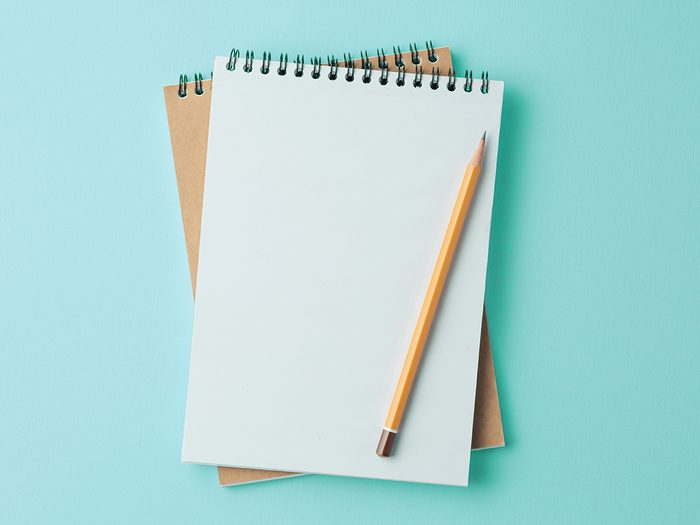
Review info afterward
When you learn something new, a great way to remember it is to go over the information later, honing in on the most important points. “Summarizing activates the brain’s frontal networks to do the ‘heavy lifting’ of synthesizing, or aggregating, different pieces of knowledge to create something new,” Chapman says. This can “pump up” your brain, she says. For example, in one study, participants who replayed a scene in their mind after watching a video remembered it better than those who simply went on to a new video.
Here are more brain exercises to give your grey matter a workout.

Make connections
While you’re going over the new information in your mind, you can also strengthen your chances of remembering if you form associations with things you already know. For example, if you meet someone who reminds you of a famous actor, use that as a memory hook to recall their name. “When we can attach some personal meaning, that is also shown to enhance our ability to remember,” Zientz says. You can also use mental pictures—for example, if someone’s last name is Baker, picture them wearing a chef’s hat, or if their name is Tiffany, picture diamonds. Even sounds and odours can form links that strengthen memories. “There is evidence that music and smell are both often associated with triggering deep-seated memories from the past,” Zientz says.
Now that you know how to improve your memory, learn how to spot the early signs of dementia.